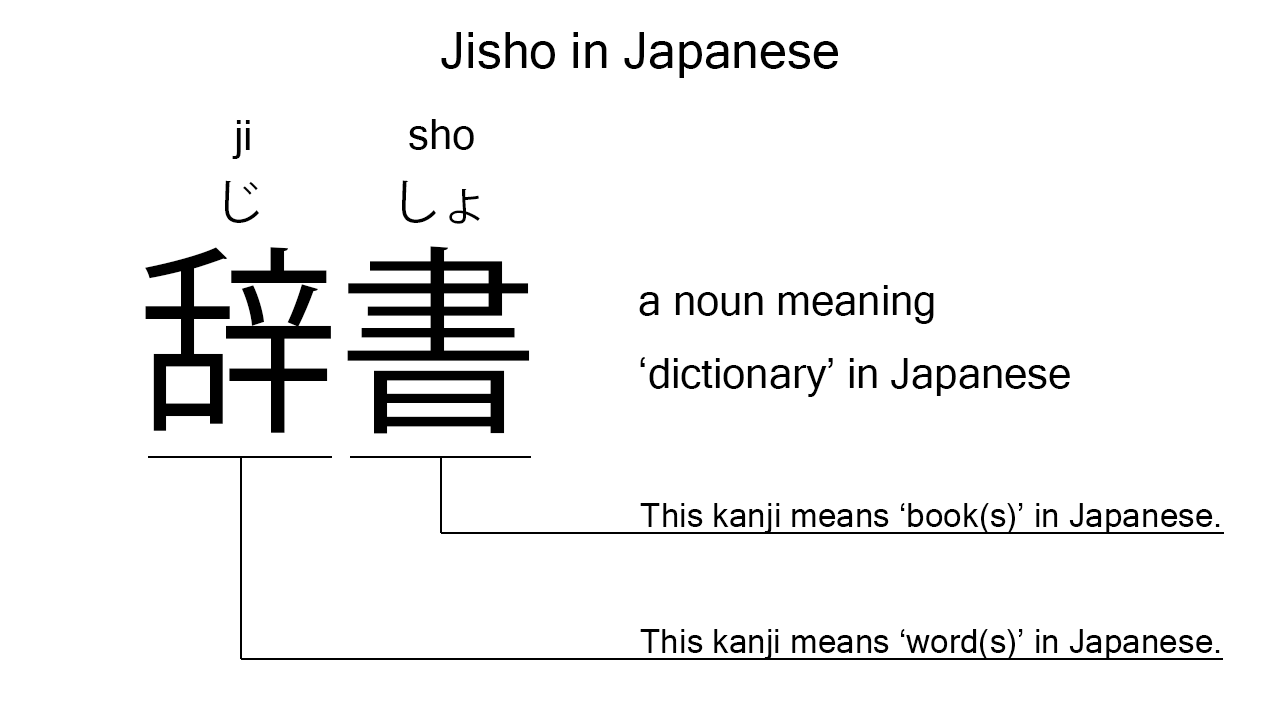What does “jisho” mean in Japanese?
Native speakers say jisho to mean a ‘dictionary’ in Japanese. Perhaps, some Japanese learners know this word as it is sometimes used in Japanese textbooks. In this blog post, however, I will explain this word in detail based on its kanji expression. And also, I will explain how to use it through example sentences. My explanations would help Japanese learners understand jisho more clearly. Then, let’s get started!
Contents
Definition and meaning of “jisho”
Let me start with the definition and meaning of jisho.
- jisho – 辞書 (じしょ) : a noun meaning a ‘dictionary’ in Japanese. This can also work as plural. Learn more about Japanese plural.
The definition and meaning are simple and clear. To understand this noun more clearly, however, let me explain its kanji characters in detail, one by one.
Jisho in kanji
The kanji expression of jisho consists of the following two kanji characters:
- 辞 : a kanji character used to mean a ‘word’ in Japanese.
- 書 : a kanji character used to mean a ‘book’ in Japanese.
From these two kanji characters, we can understand that the formed noun literally means a ‘book of words’ in Japanese. This literal interpretation is not completely in line with the actual meaning, but still very close, I think. Dictionaries are often books which contain many words.

When we meet new kanji expressions, we should check their kanji characters in detail to understand their meanings clearly and deeply. In many cases, kanji characters tell us a lot about the meanings of the expressions they form. Actually, here, we could get the better understanding of jisho through the detailed kanji check above.
So far, I’ve explained the definition and meaning of jisho together with its kanji characters. Then, let me explain how to use it through the example sentences below.
How to say “dictionary” in Japanese
kyou boku wa jisho wo kat ta – 今日僕は辞書を買った (きょうぼくはじしょをかった)
Today I bought a dictionary.
Below are the new words used in the example sentence.
- kyou – 今日 (きょう) : a noun meaning ‘today’ in Japanese. This can also work as an adverb almost anywhere in a sentence. In the example, this works as an adverb at the beginning of the sentence to mean ‘today’ in Japanese.
- boku – 僕 (ぼく) : a pronoun meaning ‘I’ in Japanese. This is used mainly by boys and young males.
- wa – は : a binding particle working as a case marker or topic marker. In the example, this works after boku to make the subject in the sentence.
- wo – を : a case particle used to make the object word in a sentence. In the example, this is used after jisho to make the object in the sentence.
- kat – 買っ (かっ) : one conjugation of the verb, kau, which means ‘to buy’ in Japanese. In the example, it has been conjugated for the better connection with its following word.
- ta – た : an auxiliary verb used after a verb, adjective, or auxiliary verb to make its past tense form. In the example, this is used after kat to make its past tense form, kat ta.
This is a typical usage of jisho. In this example, it works together with the case particle, wo, to become the object in the sentence.
Another example of “jisho”
watashi mo nihongo no jisho wo kat ta – 私も日本語の辞書を買った (わたしもにほんごのじしょをかった)
I bought a Japanese dictionary, too.
Below are the new words used in the example sentence.
- watashi – 私 (わたし) : a pronoun meaning ‘I’ in Japanese.
- mo – も : a binding particle making the subject word or the object word in a sentence with adding the meaning of ‘too’, ‘also’, or ‘as well’. In the example, this works after watashi to make the subject in the sentence with adding the meaning of ‘too’.
- nihongo – 日本語 (にほんご) : a noun meaning ‘Japanese’ or more specifically ‘the Japanese language’ in Japanese.
- no – の : a case particle joining two nouns. Normally, the first one can work as a modifier to describe the second. In the example, this works to join nihongo and jisho. The formed phrase literally means a ‘Japanese dictionary’ in Japanese.
This is another example of jisho. In this example, it works as a part of the noun phrase, nihongo no jisho, which means a ‘Japanese dictionary’ in Japanese. When we want to mean a ‘dictionary’ in Japanese, anyway, jisho is always a very good option.
Summary
In this blog post, I’ve explained the definition and meaning of jisho in detail based on its kanji expression. And also, I’ve explained how to use it through the example sentences. Let me summarize them as follows.
- jisho – 辞書 (じしょ) : a noun meaning a ‘dictionary’ in Japanese. This can also work as plural. These two kanji characters literally mean a ‘book of words’ in Japanese. This literal interpretation is not completely in line with the actual meaning, but still very close, I think. Dictionaries are often books which contain many words.
Hope my explanations are understandable and helpful for Japanese learners.
Leave a Reply